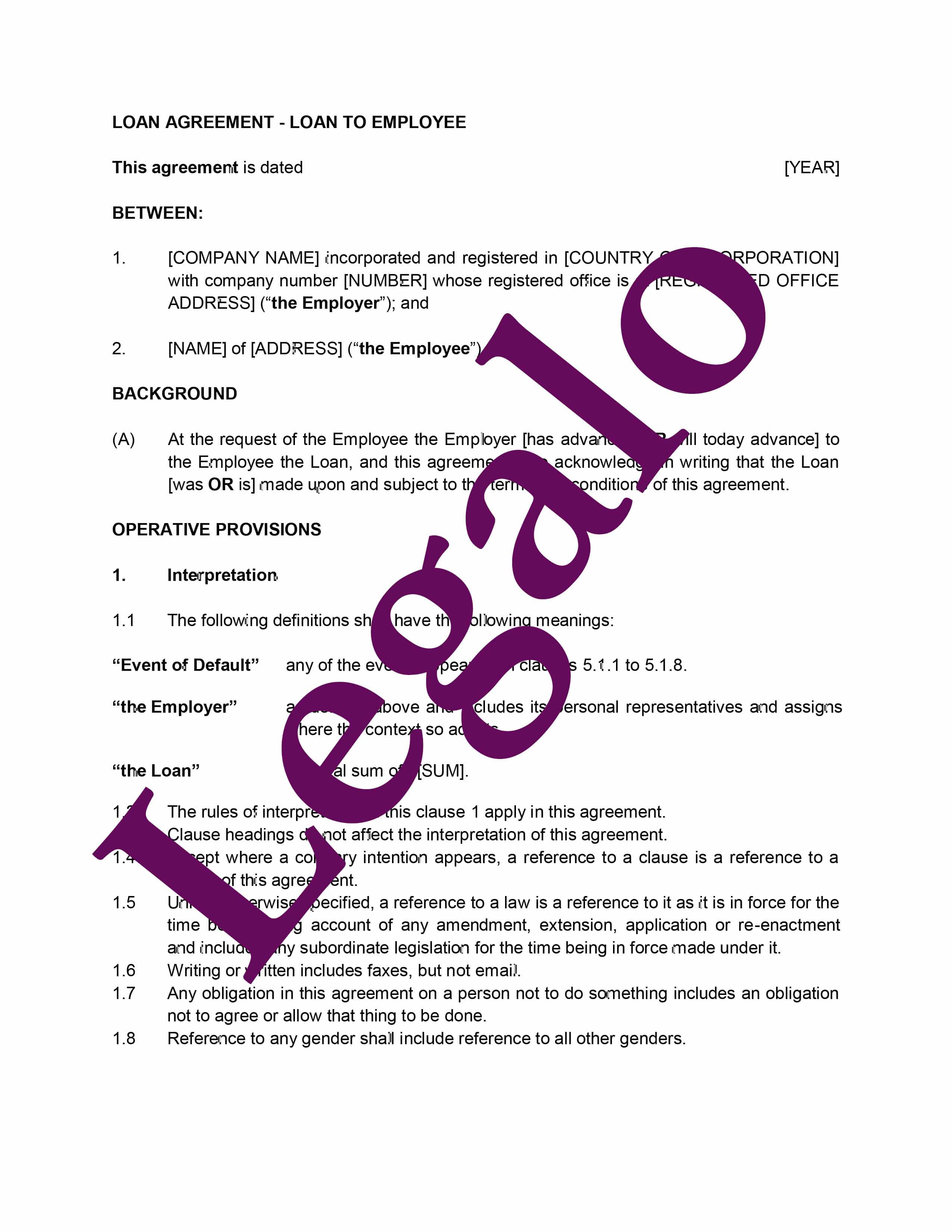Employee Loan Agreement
Our Employee Loan Agreement template:
- UK-Solicitor-drafted for accuracy
- Includes full guidance notes
- Suitable for an unsecured loan
- Covered by our money-back guarantee!

How Does It Work?
-
1. Download
-
2. Edit
-
3. Print
-
4. Sign
Our Employee Loan Agreement template is for use by a business that has made a loan, or which wants to make a loan, to one of its employees. The written loan agreement for loans to employees will help you document the terms of the loan and complete details about interest and repayment of the loan by instalments.
This template employee loan agreement has been drafted so that it is easy to edit and covers the most common employee loan situations. For example:
- the loan can make provision for whether interest is being charged on the loan; and
- the loan can make provision for its repayment in full by one lump sum or over a period through paying instalments at a frequency that you can set out.
Please note that this template does not make provision (a) for security to be taken by the employer or (b) for there to be a guarantor of the loan. If you want to take security or have a guarantor to guarantee the repayment of the loan, then you will need to use one of our other loan agreements: secured loan agreement; or loan agreement with guarantor.
There can be a taxable benefit created by a loan to an employee. For details on this, please see: https://www.gov.uk/expenses-and-benefits-loans-provided-to-employees.
Using this Employee Loan Agreement template
Once you buy the loan agreement template, you can download it in Microsoft Word format. Then simply save the template to your computer and edit as needed. Included in the download are our detailed guidance notes that take you through each step of completing the agreement and also explain each clause’s meaning and effect. You will find completing your draft quick and easy to do with our guide.
You can reuse the template whenever you make a loan to an employee, but you need only pay once. Whenever we update the template in the future, we will make the updated template available to you in your account for immediate download at no further expense. You pay only once – just one part of the Legalo advantage.
What to do if an employee asks for a loan
The employer is under no legal obligation to provide any employee with a loan. It is a discretionary matter for the employer. If you do agree to a loan, have a think about an agreement to cover the following issues:
- the size of the loan;
- whether to charge interest;
- whether to take security;
- the size of the instalments to repay the loan; and
- how long it will be before the loan is repaid.
Legalo’s template for a loan agreement with an employee covers all these issues, other than security. It assumes that sufficient security for smaller loans will be provided by way of the right to deduct the loan repayments from the wages of the employee. However, this is something for the employer to consider, and might be needed for larger loans.
Can an employer give a loan to an employee in the UK? Can an employer give an employee a loan? Can a private company give a loan to its employees? Can a limited company loan an employee money?
It is legal to do this in the UK. If the employer decides that it will offer loans to its employees, it can do so. However, it is worth considering an application process and a policy that ensures that the process is fair, equitable and not discriminatory.
Is a hand-written loan agreement legal?
Yes, as long as the agreement is clear and contains the elements that make it a binding contract:
- agreement;
- capacity;
- consideration; and
- it is signed.
The easier way to handle this is to use a good template, such as Legalo’s one. This helps you ensure that you do not miss something important. It speeds up the process too, no end.
How do I write a simple Loan Agreement? How do I document a loan to an employee?
We save you the hard work and can provide you with our simple employee loan agreement to document the loan to your employee. Our template ensures you have all the necessary wording required to make the loan agreement in clear terms and legally binding.
What should be included in an employee loan agreement?
In its most basic terms, the loan agreement should include:
- the parties involved in the agreement;
- how much money the employer is lending;
- when the instalments must be paid back and in what amounts;
- that the employer has permission to make deductions from the employee’s wages;
- the interest charged; and
- the default provisions that might mean the loan should be repaid earlier, e.g. if the employee leaves his job.
Can a company give an interest-free loan to its employees?
An employer can give an interest-free loan for certain requests on a short-term basis. For example, this could cover a train season ticket, so that the employee can commute to work.
Is a loan to an employee taxable? Is an interest-free loan taxable to employees?
If an employer makes a loan to an employee to cover the costs of buying a train season ticket in advance, it usually makes it on an interest-free basis. You can make a loan of up to £10,000 to a full-time employee on an interest-free basis without its incurring income tax and NIC as a taxable perk. The loan to such an employee does not include an employee who is a shareholder in a close company.
Every employee must repay their loan or the amount that they have not repaid becomes a taxable payment. If the employer writes off the loan, this too becomes taxable as salary.
For loans to shareholders in close companies, if any part of the loan is still owing 9 months after the end of the accounting year of the company in which the company made it, then the loan is taxable as if it were a dividend. The tax rate is the higher rate of income tax applicable to dividends (currently 32.5%). This under section 455 of the Corporation Tax Act 2010. There is a tax refund if the employee later repays the loan within 4 years (under section 458).
An overdrawn director’s loan account counts as such a loan. For more about the tax side of things for employee loans, see the ACCA’s website.
Is loan repayment taxable income in the UK?
The repayment instalments of a loan are not taxable as such. An employee usually repays his loan out of salary, and that salary is fully taxable as normal. There is no saving in tax or NIC just because the employee uses part of their salary for repayment of a loan.
What is the risk in an employee loan?
There is a risk an employee leaves their job before they have repaid the loan. While the loan agreement should say in this case the balance of the loan becomes repayable immediately, there is a risk with a larger loan that it is more than the final net salary payment due to the employee. Most employers who make employee loans do so on an unsecured basis, so this comes with some risk.
What are the advantages and disadvantages of employee loans?
There are no significant advantages to the employer of making loans to its employees. It may expect some loyalty in appreciation, but you cannot rely on this. You can use the attraction of an interest-free season ticket loan to aid in recruitment. The main disadvantage is one of risk regarding repayment, as referred to above.
Guide to our Employee Loan Agreement template
Most of the template closely follows our standard loan agreement template, so you can preview the guide to that here. The key differences in the guide are as follows:
3. Repayment
Here state the date when the first instalment is due and whether instalments are payable weekly or monthly. As set out in clause 3.2, we presume that the employee will make repayment by way of deductions by the employer from the employee’s weekly wage or monthly salary. You would need to make such an arrangement clear, by an express provision in the contract. Otherwise it might constitute an unlawful deduction from wages. The employee could apply to the Employment Tribunal to have it reversed in such a case.
5. Immediate repayment
If there is default by the employee, the loan becomes repayable in full immediately in order to protect the employer’s rights. The clause lists various events of default. They include the employee’s ceasing to be an employee of the employer or another company in the same group.
We have omitted the clause 6 covenants.
We’ve grouped clauses 7 to 11 together as one clause.





